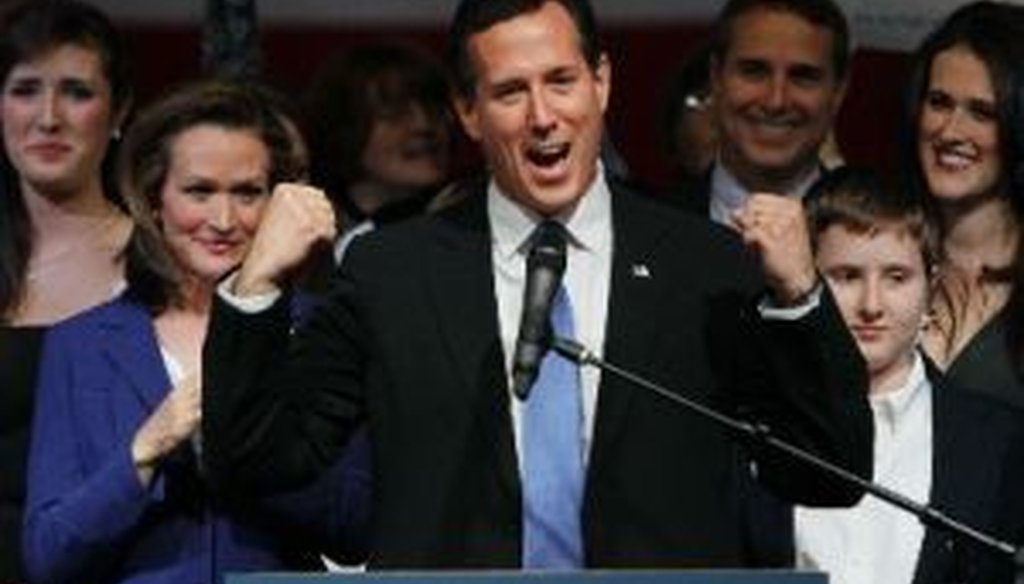

Our only agenda is to publish the truth so you can be an informed participant in democracy.
We need your help.


Rick Santorum addressed supporters in Steubenville, Ohio, after Super Tuesday balloting on March 6, 2012.
In a speech to supporters at the end of the Super Tuesday primaries on March 6, 2012, Rick Santorum offered a set of statistics designed to highlight what he sees as the growing dependence of Americans on the federal government.
"In a very short period of time, the next two years, a little less than 50 percent of the people in this country depend on some form of federal payment, some form of government benefit to help provide for them," Santorum said. "After Obamacare, it will not be less than 50 percent; it will be 100 percent."
We will take up the two parts of this statement in separate items. In this item, we’ll look at whether it’s correct that "a little less than 50 percent of the people in this country depend on some form of federal payment, some form of government benefit to help provide for them."
We’re going to ignore Santorum’s focus on what will happen within "the next two years," since we don’t have a crystal ball. But we think the most recent data can serve as a fair stand-in instead.
For that, we can use a table produced by the U.S. Census Bureau that offers data for the average number of Americans who received benefits from selected government programs during a three-month period between January and March 2010.
The table includes such non-means-tested programs as Social Security, Medicare, unemployment compensation, veterans' compensation, workers' compensation, railroad retirement and veterans' educational assistance. It also includes such means-tested programs as Medicaid, food stamps, the Women, Infants, and Children program, federal Supplemental Security Income, public or subsidized rental housing, Temporary Assistance for Needy Families, free or reduced-price school breakfasts and lunches, energy assistance and other cash assistance.
The Census Bureau found that a little over 147 million Americans received payments from at least one of these programs at a time when the U.S. population was just over 303 million. This meant that 48.5 percent of Americans received federal cash or cash-like benefits -- and it means that Santorum’s number is well-supported. In fact, counting such items as amounts refunded from the Earned Income Tax Credit or agricultural subsidies -- neither of which are included in these figures -- would push that number higher.
Our colleague at the Washington Post Fact Checker concluded that the usefulness of these numbers is weakened because they count everyone in a household as benefiting from a particular federal payment even if that payment is made in the name of only one person. We think that's a fair point, although we would add that if a couple and their two children live under the same roof as grandma, and she receives Social Security and Medicare, those federal benefits add to the resources available to the rest of the family. And if a child gets free school lunches, his parents will have more disposable income as a result.
Our ruling
The percentage of Americans "who depend on some form of federal payment" is indeed "a little less than 50 percent," as Santorum said -- it was 48.5 percent in 2010. If anything, the ongoing rise in usage of food stamps and other federal assistance programs may have pushed this number higher, and adding in tax refunds from the Earned Income Tax Credit or agricultural subsidies could push the number higher still.
The number, however, includes every member of a household in which one member receives benefits, and in some households, it would be a stretch to say, as Santorum does, that as a result of that every member will "depend on some form of federal payment." Discounting for that, we rate Santorum’s statement Mostly True.
Rick Santorum, Super Tuesday speech in Steubenville, Ohio, Jan. 6, 2012
U.S. Census Bureau, "Table 2 -- People by Receipt of Benefits from Selected Programs: Monthly Averages," First Quarter 2010
Email interview with Henry Aaron, senior fellow at the Brookings Institution, Mar. 7, 2012
Email interview with Dean Baker, co-director of the Center for Economic and Policy Research, Mar. 7, 2012
Email interview with Julia Isaacs, fellow at the Brookings Institution, Mar. 7, 2012
Email interview with Michael Wiseman, professor of economics and public policy, and Theresa Anderson, research assistant, George Washington University Institute of Public Policy, Mar. 7, 2012
In a world of wild talk and fake news, help us stand up for the facts.
